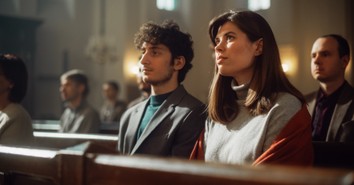Low Budget "Paper Clips" Doc Flings Hope to Millions

Release Date: September 8, 2004 (limited)
Rating: G
Genre: Documentary
Run Time: 1 hr. 28 min.
Director: Elliot Berlin, Joe Fab
Actors: Tom Bosley, Linda Hooper, David Smith, Sandra Roberts, Peter Schroeder
Whitwell, Tenn. (pop: 1,600) isn’t exactly world-renowned for its diversity. The town has no Jews, no Catholics, only one Hispanic and five African-Americans, and most everyone worships at the local Baptist church. Like most Southern enclaves, Whitwell has also faced its share of biases – some true, some untrue – and it certainly hasn’t helped that its so darn close to the birthplace of the Ku Klux Klan and the courthouse where the 1925 Scopes Monkey Trial took place. So what’s a town to do?
A group of middle school students took up the challenge, albeit unwittingly. In an attempt to comprehend the incomprehensible, they chose to study the Holocaust. And, because the idea of six million deaths seemed so surreal, they opted for a visual demonstration. The students decided to collect six million paper clips – one for every person murdered – as a symbol of what had happened during WWII. They selected paper clips because they were practical, and because they had been worn by Norwegians during the war as a sign of silent protest.
The kids put out the word and the paper clips began to pour in. But, even the many thousands were not enough – not nearly. It would take a miracle, which is exactly what happened. Two German journalists assigned to cover the White House made contact with the students and offered to help. Soon, the project had received crucial national publicity. Just weeks after a “Washington Post” article and a segment on “World News Tonight,” 24 million paper clips in some 25,000 pieces of mail, each attached to a story, had arrived in Whitwell.
Ultimately, almost 30 million paper clips would amass in that tiny town, and the sight of them – not to mention the space requirements for them – were more than anyone could have imagined. But that is the least of what happened to the good citizens of Whitwell. The experience was, to say the least, a dramatic eye-opening for everyone. One of the two teachers spearheading the project described the letters, which were painstakingly documented and filed, as “an ice water bath.” He admitted to his own racism and spoke of his remarkable change of heart. He had never wanted Southern children stereotyped as “stupid rednecks,” yet he had stereotyped people of different faiths and skin color. Other residents spoke of their emotional journeys as well, forming a chorus of transformed lives. Holocaust survivors, their families and the families of victims all came to Whitwell to share their stories. They shared, ironically, from the cross-draped pulpit of a church, as Germans and Americans, young and old all wept as one, finding hope and healing together.
The paper clips found a home in a renovated railcar that had been used to transport Jews to the camps. Today, it serves as a living memorial to tourists and children who come to listen and learn from the students of Whitwell Middle School. One can only guess that God is greatly blessing this previously impoverished town, and rejoices with them for their faithfulness.
Filmed over several years, with scenes from Spielberg’s recollections of Holocaust survivors, this riveting documentary is filled with repentance, joy and promise. It could use some editing and, as dawn crept over the hills and the music swelled during the film’s opening sequence, I feared the worst. But within minutes, I was in tears that continued unabated, unashamedly, for the next 90 minutes. I was not alone, and how rare it is that one film critic – much less dozens – will cry at any screening. Perhaps as rare as Miramax Studios (which is run by two Jews, Bob and Harvey Weinstein), distributing a movie such as this.
Very rarely are we treated to a film – any film – that not only communicates truth, but unravels stereotypes about Christians. Most screenwriters and directors seem intent on portraying believers as immoral, uneducated and cruel, with clichéd depictions of drunken priests, Bible-thumping racists and hypocritical hatemongers. Then, for an added dose of formulaic fun, these “Christian” characters are usually Southern, too. It’s the modern-day equivalent of stoning, and it’s just as popular now as it was when Jesus was around.
Amazingly, “Paper Clips” contains none of this. A low-budget documentary made by relatively inexperienced filmmakers, it not only eschews the labels about both Christians and Southerners, but broadens all parameters, flinging hope in every direction like millions of stars in the darkened sky. It is a film to touch the soul of anyone with a soul to be touched.
OBJECTIONABLE CONTENT
- Drugs/Alcohol Content: None.
- Language/Profanity: None.
- Sexual Content/Nudity: None.
- Violence: Conceptual violence only, including numerous references to the Holocaust, the death camps, the rail cars and the gas chambers.
Originally published September 08, 2004.







